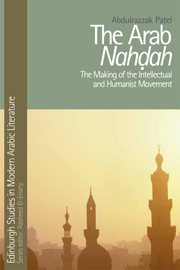Book contents
- Frontmatter
- Contents
- Series Editor's Foreword
- Acknowledgements
- Preface
- Introduction: Perspectives, Paradigms and Parameters
- 1 Contemporary Interpretations of the Nahḍah: Tradition, Modernity and the Arab Intellectual
- 2 The Reintegration of Pre-modern Christians into the Mainstream of Arabic Literature and the Creation of an Inter-religious Cultural Space
- 3 Guardians of the Pre-modern Arab-Islamic Humanist Tradition: Legends without a Legacy, a Tradition without Heirs
- 4 Language Reform and Controversy: The al-Shartūnīs Respond in Defence of the Pre-modern Humanist Tradition
- 5 Arabism, Patriotism and Ottomanism as Means to Reform
- 6 Arab Intellectuals and the West: Borrowing for the Sake of Progress
- 7 Education, Reform and Enlightened Azharīs
- 8 Enacting Reform: Local Agents, Statesmen, Missionaries and the Evolution of a Cultural Infrastructure
- Conclusion
- Bibliography
- Index
1 - Contemporary Interpretations of the Nahḍah: Tradition, Modernity and the Arab Intellectual
Published online by Cambridge University Press: 05 October 2013
- Frontmatter
- Contents
- Series Editor's Foreword
- Acknowledgements
- Preface
- Introduction: Perspectives, Paradigms and Parameters
- 1 Contemporary Interpretations of the Nahḍah: Tradition, Modernity and the Arab Intellectual
- 2 The Reintegration of Pre-modern Christians into the Mainstream of Arabic Literature and the Creation of an Inter-religious Cultural Space
- 3 Guardians of the Pre-modern Arab-Islamic Humanist Tradition: Legends without a Legacy, a Tradition without Heirs
- 4 Language Reform and Controversy: The al-Shartūnīs Respond in Defence of the Pre-modern Humanist Tradition
- 5 Arabism, Patriotism and Ottomanism as Means to Reform
- 6 Arab Intellectuals and the West: Borrowing for the Sake of Progress
- 7 Education, Reform and Enlightened Azharīs
- 8 Enacting Reform: Local Agents, Statesmen, Missionaries and the Evolution of a Cultural Infrastructure
- Conclusion
- Bibliography
- Index
Summary
This chapter challenges some of the standard paradigms on the origins and development of the nahḍah with particular reference to the position of Arab Christian intellectuals, who have traditionally been regarded as its pioneers and as constituting a transposable unified community different and alienated from their Muslim counterparts, but inherently attracted to the West. The chapter also examines contemporary interpretations of the nahḍah in the light of the ongoing debate on tradition and modernity in Arab intellectual and literary circles. It critiques the views of a number of leading Arab intellectuals who, in viewing modernity as a magnificent homogeneous phenomenon that guarantees progress and success, and tradition as its opposite, attribute Arab ‘backwardness’ to the failure of nahḍah intellectuals to make an episte-mological break with tradition and internalise modernity. In so doing, this chapter prepares the ground for some of the main arguments developed in the book.
Nahḍah
The Arab world's encounter with modern Europe in the nineteenth century would be the first of a long series of uneasy relationships with the West. It created a painful realisation among Arab intellectuals of the ‘decline’ (inḥiṭāt) of their own societies as traditional ideas and ways of life were challenged in the name of modernity. Since then Arab thinkers have compared the decline of their societies with the accomplishments of Western civilisation, an agonising distinction when one considers that the Arab world was at the height of its cultural and political glory, and at the vanguard of science and philosophy, when Europe was steeped in medieval ignorance; not to mention the success of European nations in colonising the Arab world.
- Type
- Chapter
- Information
- The Arab NahdahThe Making of the Intellectual and Humanist Movement, pp. 12 - 35Publisher: Edinburgh University PressPrint publication year: 2013



